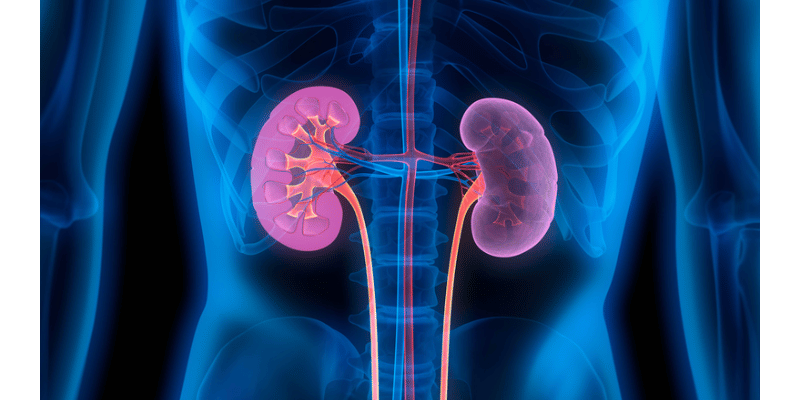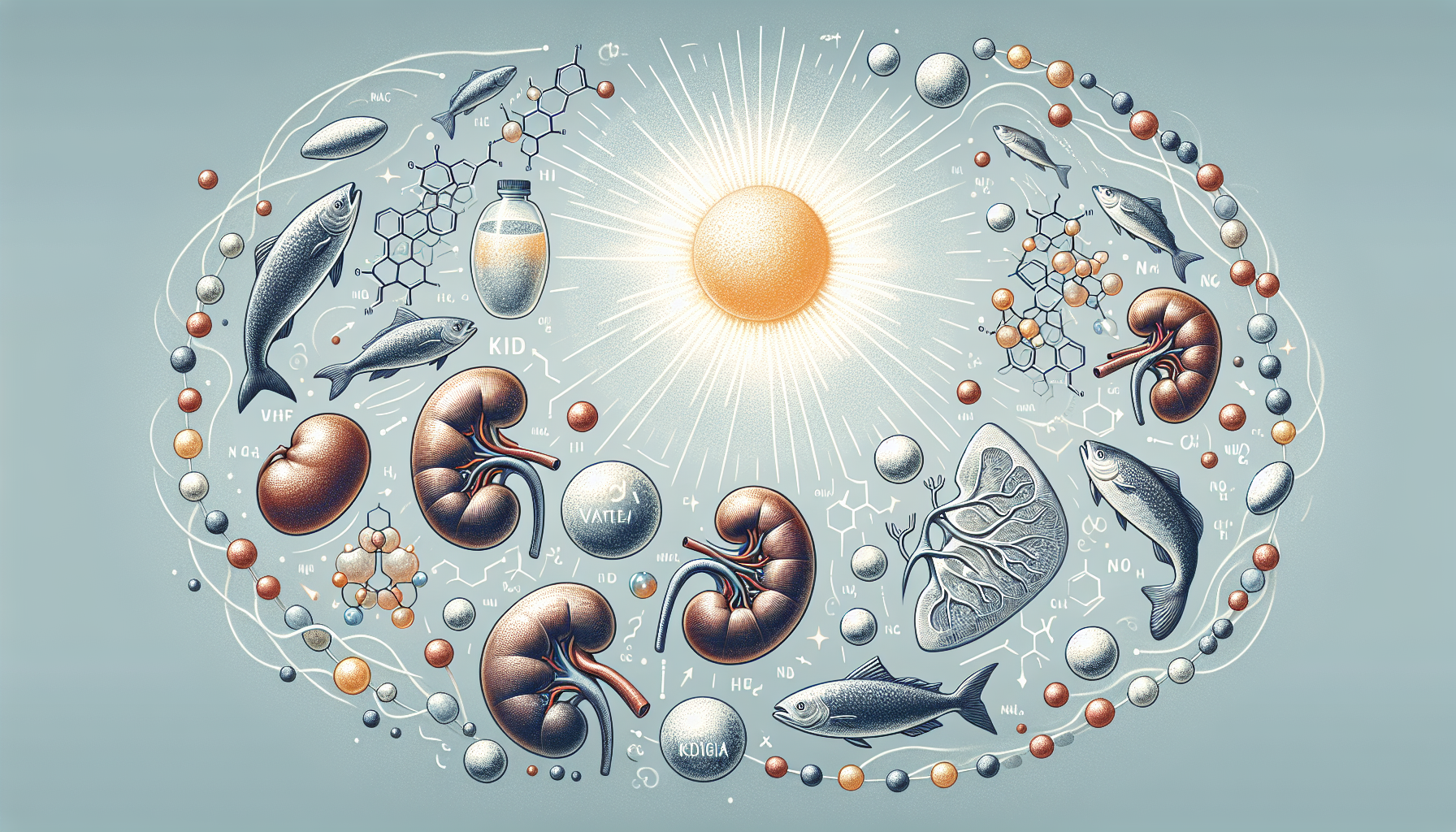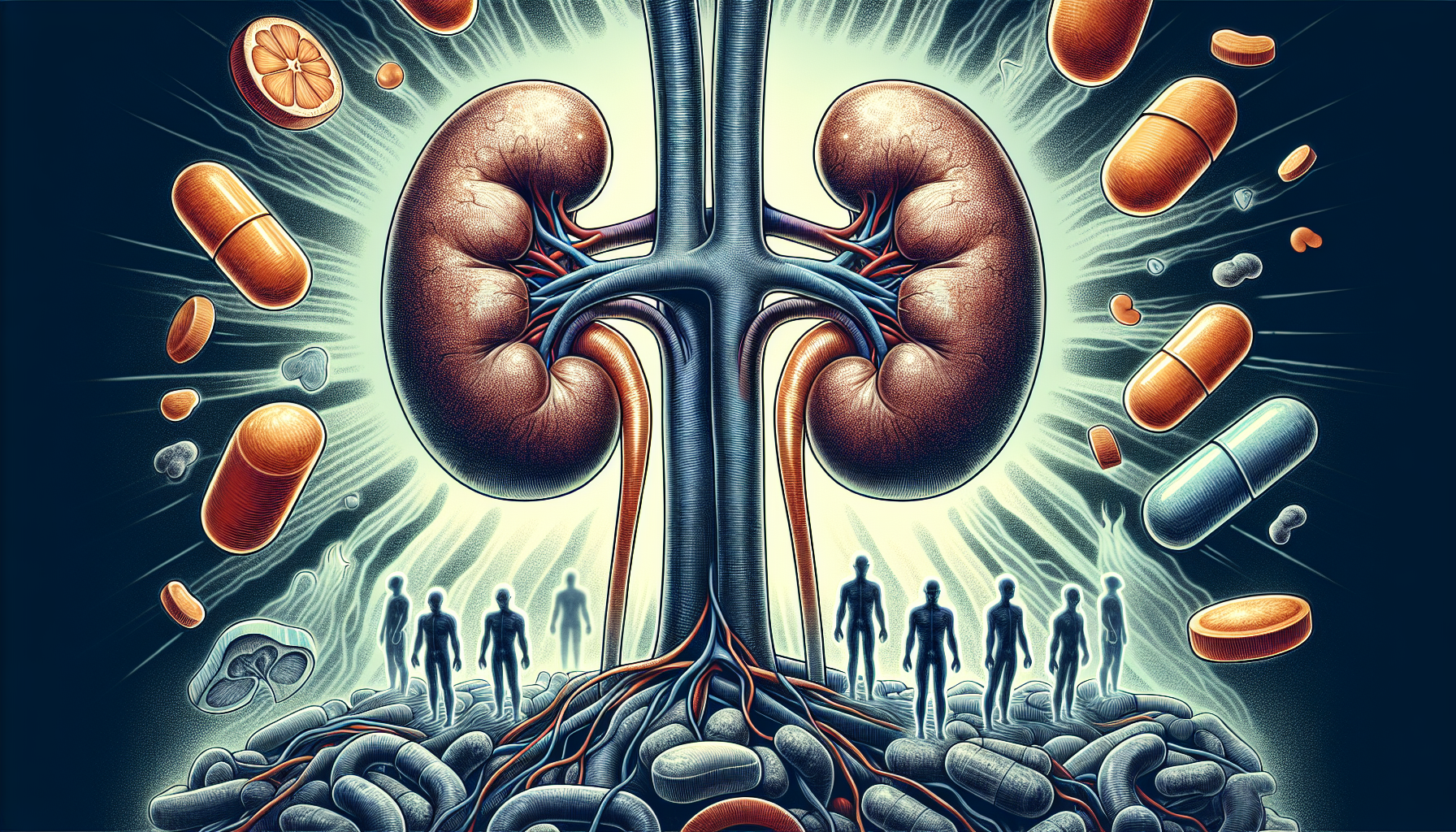Finding the right supplements can be pivotal if you're concerned about kidney health or navigating the complexities of chronic kidney disease. The best supplement for kidney health isn't just about popping pills—it's about understanding what each supplement does, how it interacts with your kidneys, and how it fits into your overall health strategy. In this article, we'll explore essential supplements like Vitamin D, Omega-3 fatty acids, and N-acetyl cysteine (NAC) that have been recognized for their benefits in maintaining healthy kidneys and supporting kidney function. Plus, we'll explore the significance of lifestyle modifications that can synergistically enhance your kidney health.
Addressing kidney health is crucial, especially for those at increased risk of kidney disease or already managing kidney issues. Supplements can be supportive by optimizing blood tests, reducing inflammatory markers, and enhancing the production of enough red blood cells. However, not all supplements benefit everyone; certain ones can exacerbate kidney problems, such as high-dose Vitamin C or those containing phosphorus and potassium. As we discuss how to support kidney health and slow the progression of conditions like CKD, we'll also highlight the importance of consulting with a healthcare provider to tailor your approach to supplements and lifestyle choices that safeguard your kidneys. This comprehensive guide aims to give you the knowledge needed to make informed decisions about your kidney health journey.
Key Takeaways
- Maintaining kidney health involves lifestyle choices like managing blood pressure and blood sugar, dietary tweaks, and consulting healthcare professionals to slow Chronic Kidney Disease (CKD).
- Key supplements that support kidney health include Vitamin D for calcium absorption, Omega-3 fatty acids for anti-inflammatory benefits, and N-Acetyl Cysteine (NAC) as a potent antioxidant.
- Caution is advised against high-dose Vitamin C, phosphorus-containing, and potassium-containing supplements, as they can potentially harm kidney health, especially in those with existing CKD.
Understanding Kidney Health

Our kidneys are workhorses, constantly regulating blood pressure, filtering out waste, and balancing electrolytes. They’re the behind-the-scenes maestros of our body’s functions, from removing excess water and toxins to making red blood cells and activating vitamin D. When kidney function fails, the delicate balance of our system is disrupted, and chronic kidney disease (CKD) can result. This silent thief slowly eats away at kidney function over time due to conditions like diabetes. With 15% of U.S. adults having CKD, learning how to support kidney health and maintain normal kidney function is not just interesting; it’s necessary for living life to the fullest.
But here’s the thing — if left unchecked, CKD can end in kidney failure and dialysis or a kidney transplant. The symptoms of advanced CKD are no picnic, including:
- anemia
- depression
- increased infection risk
- mineral imbalances in the blood
The good news? With an integrative healthcare practitioner, lifestyle changes and dietary tweaks can support kidney function and slow CKD. Managing blood pressure, controlling blood sugar, and living a heart-healthy lifestyle are the best defenses against CKD.
Key Supplements for Kidney Health

So, you want to support kidney health? Well, a whole treasure trove of supplements are calling your name, promising to boost your kidney function. Vitamin D is the shining star for its importance in kidney function, and Omega-3’s are the anti-inflammatory superheroes.
N-acetyl cysteine (NAC) is also a powerful antioxidant. Each of these players has its special power in the fight against kidney disease and is an added layer to your dietary and lifestyle arsenal.
Vitamin D
The story of Vitamin D and kidney health is one of dependence and transmutation. As the kidneys convert Vitamin D into active form, they allow calcium and phosphorus, the minerals for strong bones and a healthy body, to be absorbed. However, chronic kidney disease can block this alchemical process, and the body will crave the active vitamin it needs to thrive. That’s where supplementation comes in, to increase calcium and calm down parathyroid hormone levels, which can get out of control if left unmanaged.
However, vitamin D supplementation is not without its risks. It’s a dance where balance is everything — too much calcium from unmanaged supplementation can be just as bad as a deficiency. Regular monitoring of calcium, phosphorus, and parathyroid hormone levels is crucial to ensure Vitamin D is a friend, not a foe, in the journey of kidney health. In this delicate balancing act, dosages are 2,000 to 4,000 IU daily or up to 50,000 weekly, but only when phosphorus levels are within the normal range.
Omega-3 Fatty Acids
Omega-3 fatty acids are pivotal in holistic health management, particularly in mitigating chronic inflammation—a major risk factor for kidney and heart diseases. These essential fats offer extensive benefits; they alleviate inflammation and are critical to cardiovascular health. By lowering blood pressure and reducing the risk of heart disease, Omega-3 fatty acids contribute significantly to the interconnected health of the heart and kidneys. The healthier the heart, the better it can support kidney function, thus preventing the onset of further complications.
This integral connection underscores the dual benefits of Omega-3s—they're not just anti-inflammatory agents but guardians of both heart and kidney health, ensuring they function in harmony. To explore more about the benefits of Omega-3s and to discover specific products suited to your lifestyle, especially if you prefer plant-based options, consider reading our detailed article, “From Algae to Awesomeness: Five of The Best Vegan Omega-3 Supplements You Need to Know.” Here, we've curated a list of five top-notch vegan Omega-3 supplements from leading nutraceutical companies, providing you with a comprehensive resource to make informed choices about your supplementation needs.
N-Acetyl Cysteine (NAC)
N-acetyl cysteine (NAC) stands out in kidney health support and is lauded for its robust antioxidant capabilities that target harmful oxygen radicals. These radicals can adversely affect kidney function, particularly in individuals managing chronic kidney disease (CKD). NAC offers hope through its potential antioxidant effects and shows promise in specific therapeutic contexts, such as hemodialysis. Studies indicate that NAC may alleviate oxidative stress and improve outcomes for uremic anemia, a prevalent complication among CKD patients.
While the benefits of NAC are promising, it is important to recognize that research is still evolving. Ongoing studies are crucial to fully delineate its effectiveness and safety across diverse groups, making NAC a compelling subject in the ongoing narrative of kidney health management. For those intrigued by the potential of NAC to bolster their health, particularly in boosting glutathione levels—an essential antioxidant in the body—our detailed article, “Unlock the Power of The Best NAC Supplement: Boost Your Glutathione Levels,” provides valuable insights. This resource lists five top NAC supplements from renowned nutraceutical companies, offering a deeper understanding of how this supplement could be integrated into your health regimen. [Link to the article]
Additional Nutritional Supplements for Kidney Health

Our journey through kidney support doesn't end with the leading players. Extra nutritional supplements, each with a unique role, offer even more nourishment for those aiming for kidney health.
Imagine B Vitamins, probiotics, and Coenzyme Q10 as a trio of wise friends, each contributing to the overall well-being of people with chronic kidney disease or dialysis.
B Vitamins
The story of B Vitamins is all about teamwork and support. Each one plays a crucial role in preventing anemia and helping produce red blood cells, which are super important for people with kidney disease. Vitamins B6, B12, and folic acid work together to keep blood cells healthy and manage homocysteine levels. High homocysteine can signal heart problems, so keeping it in check is key.
Regarding kidney health, these vitamins aren't just supplements; they're like guardians protecting the body's balance. Renal vitamins are specially made to meet the increased need for water-soluble vitamins in those with kidney disease. They often include a mix of B vitamins, providing a customized solution to strengthen the body's defenses against chronic kidney disease (CKD). Think of them as a custom-made armor designed to protect and support, ensuring the body is ready to tackle the challenges CKD might bring.
Probiotics
Let's talk about probiotics, those friendly little helpers in our gut. For those navigating the challenges of chronic kidney disease and digestive and kidney diseases, these microscopic allies can be transformative, wielding the power to:
- Balance gut microbiota: They help keep the good and bad bacteria in check.
- Reduce kidney toxins: They can lower harmful toxins that stress your kidneys.
- Protect the intestinal barrier: They act as a shield, keeping urea toxins from causing trouble.
- Boost the immune system: They create an environment that might even strengthen your immune response.
Probiotics also have a role in overall nourishment. They might influence levels of interleukin (IL)-6, an inflammatory marker, suggesting they could help with more than just gut health. With ongoing clinical trials, these beneficial bacteria are showing promise as key players in maintaining kidney health, especially for those facing the challenges of CKD.
Coenzyme Q10
Coenzyme Q10 (CoQ10) is a noteworthy supplement in managing kidney health, particularly for chronic kidney disease (CKD) patients. Renowned for its impressive antioxidant properties, CoQ10 is critical in improving kidney function. Many individuals incorporating CoQ10 into their health routines report decreased serum creatinine levels—a positive indicator of improved kidney function. Adding CoQ10 could reduce the frequency of dialysis sessions for those undergoing dialysis, making it a vital component of their treatment plan.
Furthermore, CoQ10 actively combats inflammation, targeting C-reactive protein, which is prevalent in patients with end-stage kidney disease. Its ability to lower oxidative stress is especially beneficial for hemodialysis patients, offering a dual advantage in reducing inflammation and oxidative damage. As research continues to unfold, CoQ10 is increasingly recognized as a powerful ally in the fight against kidney disease, with new studies on the horizon that may shed further light on its full range of benefits.
For a more comprehensive look at CoQ10 and to explore specific products that might be right for your health needs, check out our article, “From Heart Health to Energy Boost: Finding the Best CoQ10 Supplement for You.” In this guide, we review five top CoQ10 supplements from leading nutraceutical companies, providing detailed insights that can help you decide to incorporate this supplement into your health regimen.
Herbal Supplements for Kidney Health

So, let’s dive into the gardens of herbal medicine and see what botanicals call out to support kidney health. Moringa, Andrographis, and Turmeric are just a few of the natural wonders that may support the kidneys, each with a story of therapeutic magic waiting to be told.
Moringa
Moringa, often hailed as the 'Miracle Tree,' boasts formidable protective properties as a barrier against kidney toxicity and the oxidative stress that threatens kidney tissues. Promising findings from scientific research, particularly studies conducted on animal models, suggest that moringa seed extract can enhance kidney structure and function. This indicates that incorporating this verdant superhero into our diets might also confer similar benefits, positioning moringa as a potent ally in kidney health management.
More than just a dietary supplement, moringa is laden with many nutrients and antioxidants, making it a robust protector capable of potentially preventing kidney issues and bolstering the body’s natural defense mechanisms. As ongoing research continues to uncover the depths of its benefits, moringa shines as a beacon of hope for renal health, with many potential chapters of its benefits still to be explored and validated.
For those intrigued by moringa's potential to enhance their health, our article, “From Leaf to Life: A Guide to the Best Moringa Supplement on the Market!” offers an in-depth look at top choices. We have meticulously reviewed five top Moringa supplements from leading nutraceutical companies, providing a detailed guide to help you decide whether this supplement is right for your health needs.
Andrographis
Andrographis becomes a botanical hero in kidney protection that may reduce liver and kidney toxicity. This herb with active compounds like andrographolide is a testament to the power of nature’s medicine chest. In the laboratory of scientific research, animal studies show Andrographis may be a shield against the harmful effects of alcohol toxicity on the liver and kidneys.
As we read the story of Andrographis, we must remember that while its potential is bright, the whole story of its benefits for human kidney health has yet to be written. The promise is like a scroll waiting to be unrolled, and more evidence is needed to write its chapter in the book of kidney support.
Turmeric
The golden spice turmeric, recognized for its vibrant color and powerful properties, harbors the active compound curcumin, renowned for its anti-inflammatory effects. Curcumin’s ability to significantly reduce inflammation is backed by more than just anecdotal evidence; it’s a medically acknowledged benefit that could play a crucial role in managing kidney conditions. The anti-inflammatory properties of curcumin may provide valuable support for renal health, aiding in managing various kidney-related issues.
While turmeric adds a splash of color and health benefits to our lives, it's important to approach its use with knowledge and caution. It represents just one component of a broader kidney health strategy. Ongoing research is essential to fully uncover the potential benefits of turmeric/curcumin in renal care, making it a promising area of interest for both health professionals and patients. For those interested in exploring the benefits of turmeric/curcumin in other areas of health, particularly joint pain and inflammation, our article, “The Top Turmeric/Curcumin Supplements For Joint Pain And Inflammation,” provides a comprehensive guide. This resource details seven top turmeric/curcumin supplements from leading nutraceutical companies, offering valuable insights to help you make informed decisions about incorporating this supplement into your health regimen.
Supplements to Avoid or Use with Caution

But when we look for allies in supplements for kidney health, we must also be aware of those that can be foes. Certain supplements can be bad for kidney health and should be approached with caution, especially for those with chronic kidney disease who walk a tightrope when it comes to their kidney health.
High-Dose Vitamin C
High-dose vitamin C, though often touted for its immune-boosting properties, can be a double-edged sword for kidney health. Too much of a good thing can lead to oxalate buildup in the kidneys and set the stage for kidney stones. As Vitamin C converts to oxalates, the risk of these crystalline enemies increases. We must tread carefully with its intake, especially for those with a history or risk of kidney stones.
The wise approach is to consult your healthcare provider before taking high doses of Vitamin C so we don’t inadvertently harm our kidneys. For those concerned about kidney health, the saying ‘less is more’ holds true: avoid large doses that can do more harm than good.
Phosphorus-Containing Supplements
Navigating the path of kidney health also means being mindful of phosphorus levels, which can creep up in chronic kidney disease. Just as the river must be kept within its banks to prevent flooding, phosphorus intake must be controlled to prevent calcium leaching from bones and to safeguard against fragility and structural integrity. Phosphorus-containing supplements must be approached with caution as excess can undermine the very foundation of bone health, especially for those with advanced CKD on dialysis.
Phosphate binders in calcium supplements act as a dam to hold back the tide of phosphorus absorption in the gut. If used under medical supervision, they can help maintain the delicate mineral balance for those fighting kidney disease. So managing phosphorus is not just a recommendation; it’s a foundation for healthy kidneys in CKD.
Potassium-Containing Supplements
And then there are potassium-containing supplements. While essential for cellular function, an excess of this mineral in the blood can be dangerous for those with kidney disease, where the ability to regulate potassium levels is impaired. For these individuals, the dietary kingdom must be navigated with care, and they must avoid overindulging in potassium-rich food that can cause irregular heart rhythms or even a heart attack.
This is a tightrope walk where the fall can be deep with severe consequences. Keeping potassium levels in check is not just smart; it’s essential and requires the guidance of a healthcare provider to adjust intake according to the needs of the kidneys. When done right, it can harmonize the rhythm of kidney health.
Lifestyle Choices to Support Kidney Health
As we navigate the supplement world, we must not forget the lifestyle choices that underpin kidney health. A balanced diet, regular exercise, and adequate hydration are the threads that, when woven together, form a fabric sturdy enough to support the kidneys and maintain healthy kidneys. These lifestyle choices are not mere recommendations but integral to preserving and enhancing renal well-being.
Healthy Diet
The foundation of kidney health is a healthy diet, a mosaic of foods supporting the kidneys. A plant-based diet rich in:
- whole grains
- nuts
- fruits
- vegetables
can be thought of as a garden that grows kidney-friendly foods. The DASH diet is a roadmap for those who want to lower blood pressure and reduce the risk of heart disease, stroke, and kidney stones; it’s a culinary guide to help you make better food choices.
But moderation is key, especially when it comes to sodium. Just as a chef uses salt with a measured hand to season a dish, so must sodium intake be measured to avoid the pitfalls of fluid retention and hypertension, both enemies of kidney health.
A healthy diet is not just one meal but a lifetime of meals thoughtfully prepared and savored that can support the kidneys in their job.
Regular Exercise
The symphony of kidney health is not complete without the addition of regular exercise. Exercise is like tuning an instrument so the body’s functions, including kidney health, work harmoniously. Exercise strengthens the heart, the steady beat that sets the tempo for kidney function and helps regulate blood pressure — a key player in kidney health.
Exercise has benefits beyond cardiovascular health and preventing cardiovascular disease. It helps with weight management, which reduces the load on the kidneys and overall well-being, providing a rhythm for the body and mind. Exercise is not a sprint but a marathon, a commitment to a lifestyle that can delay the progression of kidney disease and improve quality of life.
Hydration and Fluid Management
The river of life flows smoothly; this means staying hydrated for the kidneys. Adequate water intake allows the kidneys to remove waste products and avoid the rocky shores of kidney stones and urinary tract infections. Chronic dehydration is like a drought; it can leave the kidneys dry and make them more prone to stone formation. Overhydration can burden the kidneys, especially in those with impaired kidney function, where excess fluid is a flood that the kidneys can’t manage.
Hydration is an art, like pouring tea into a cup without spilling. Beverages like water and herbal teas can help with this balance, and limiting high-sodium drinks can prevent fluid retention from getting too high. True hydration is not about drinking a lot but sipping mindfully so each drop supports kidney function and overall health.
Working with a Healthcare Provider
We need a compass to navigate the ocean of supplements and lifestyle changes. Before starting any new protocol, seeing a doctor is not just a formality; it’s a must to ensure the supplements chosen are specific to your needs and condition. They are the lighthouse to guide you so you don’t steer off course and into the unknown waters of harm.
Healthcare providers are knowledgeable; they know the map of your health and how supplements interact with medications and conditions. With their expertise, they can create a supplement protocol that supports kidney health and does not complicate it, all while navigating the complex world of herbal supplements where dosages and purity are unknown. Their guidance is gold, a safety net, and a guarantee of effectiveness in the journey to renal wellness.
Wrapping Up Our Discussion on Kidney Health
As our exploration of kidney health reaches its culmination, it's clear that achieving optimal wellness is a multifaceted endeavor. Our guide focuses on how nutritional supplements like Vitamin D, Omega-3 fatty acids, N-acetyl cysteine (NAC), B vitamins, and CoQ10 support kidney function and maintain healthy kidneys. These supplements aid in managing chronic kidney disease, preventing kidney damage, and enhancing overall vitality. Herbal supplements, often overlooked, have shown potential in supporting kidney health, offering benefits that warrant consideration alongside traditional options.
Beyond supplements, the cornerstone of kidney health lies in lifestyle choices. Regular exercise, a diet rich in dietary fiber and balanced in food groups, and proper hydration are essential for maintaining normal kidney function and preventing complications like kidney stones or kidney failure. The importance of regular blood tests and consultations with a healthcare provider cannot be overstressed, as these steps ensure that any treatment regimen, including the use of dietary supplements and prescription drugs, is tailored to individual needs and effectively manages risk factors like high blood pressure and blood sugar levels.
In this comprehensive guide, we've also highlighted the importance of early detection and management of kidney diseases, which can significantly slow CKD progression and improve quality of life. Whether you are at an increased risk for kidney disease or are currently managing kidney health issues, embracing a holistic approach that includes both supplements and lifestyle modifications can lead to significant health improvements. Remember, the path to maintaining and enhancing kidney health is best navigated with the informed guidance of a healthcare provider and a commitment to informed proactive choices.
Frequently Asked Questions
Can taking Vitamin D supplements improve kidney function?
Vitamin D supplements can improve kidney function by increasing calcium absorption and decreasing elevated parathyroid hormone levels, important for maintaining healthy bones and proper kidney function. So, it can be beneficial for individuals with chronic kidney disease.
Are Omega-3 fatty acids beneficial for kidney health?
Yes, Omega-3 fatty acids benefit kidney health as they have strong anti-inflammatory properties and offer cardiovascular benefits. This can help reduce inflammation and support overall kidney health.
What are the risks of taking high-dose Vitamin C if I have kidney disease?
Taking high-dose Vitamin C if you have kidney disease can lead to the formation of oxalate crystals, which may cause kidney stones. Limiting your intake to below 500 mg is best to lower this risk.
How does a healthy diet support kidney health?
A healthy diet supports kidney health by providing essential nutrients and helping to manage blood pressure, which is crucial for kidney function. Eating whole grains, nuts, fruits, and vegetables is beneficial.
Should I consult a healthcare provider before taking herbal supplements for kidney health?
It's crucial to consult a healthcare provider before using herbal supplements for kidney health to ensure they are safe and suitable for your specific health needs. They can also check for potential interactions with any medications you take.
Thanks for taking this journey to explore the best supplement for kidney health. If you want to add to your library of knowledge and are interested in diving deeper into some of the supplements mentioned in this article, you should check out the links above. It could be a huge time-saver - you won't be sorry you took a look.
Also, please return soon to check out our next review of another incredible supplement – we’re always looking out for YOU!
*We are NOT qualified medical advisors. The content here is only based on our personal opinions and research and should NOT be used as a substitute for a healthcare professional's advice!
**This site contains affiliate links. We may earn a small commission through links in this post.











Member discussion